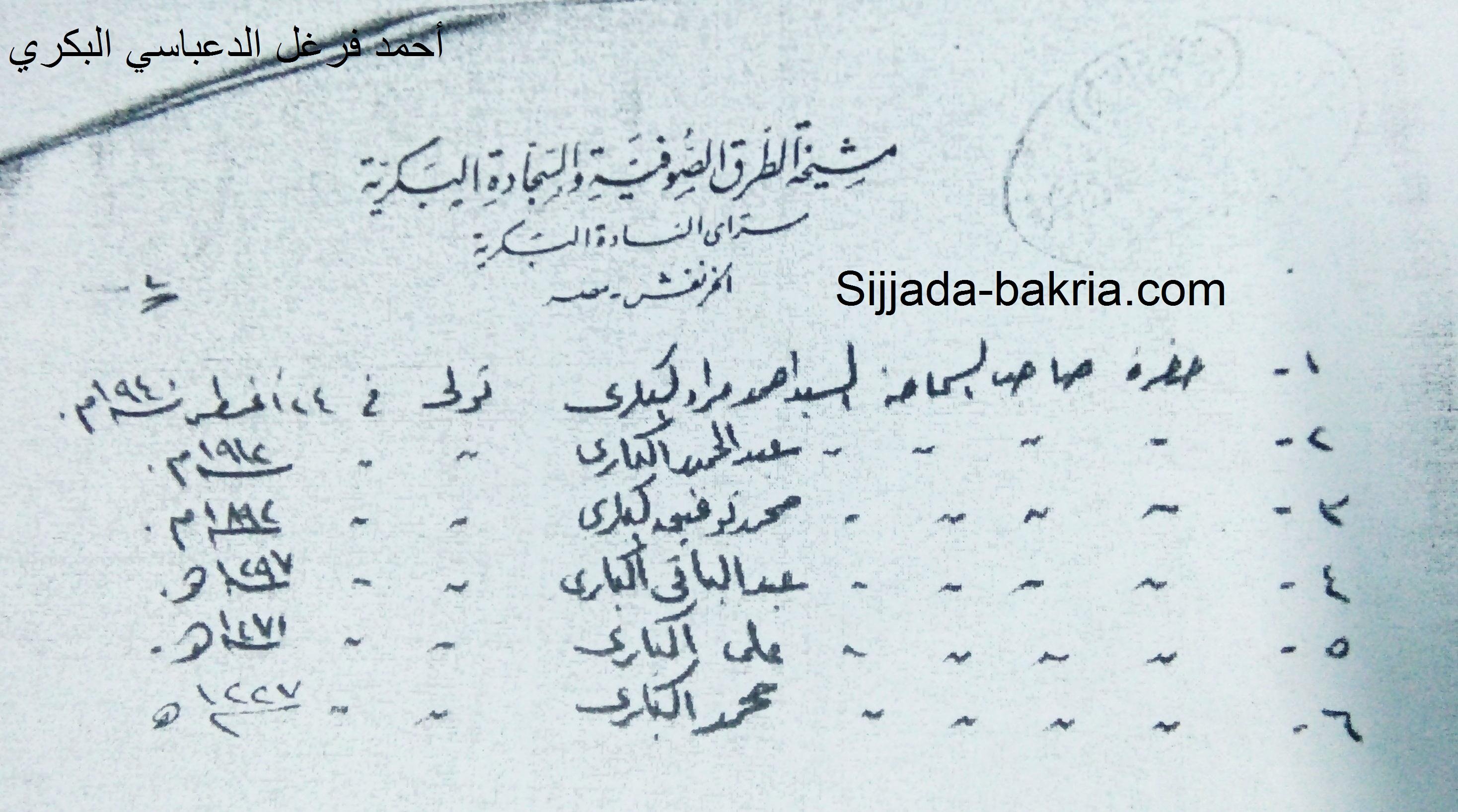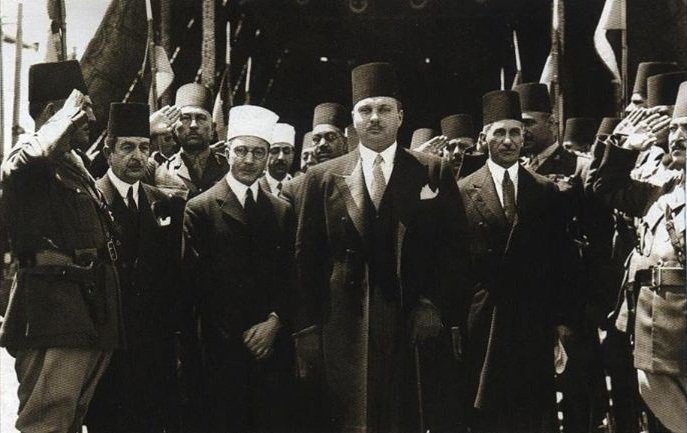Ahmad Murad Al-Bakri, Sheikh of Sijjada Bakria
Sheikh Ahmad Murad Bin (Naqib Al-Ashraf and Grand Sheikh) Abdul Hamid Efendi Bin (Naqib Al-Ashraf and Grand Sheikh) Abdul Baqi Efendi Bin (Naqib Al-Ashraf and Grand Sheikh) Ali Efendi Bin (Naqib Al-Ashraf and Grand Sheikh) Muhammad Efendi Bin Muhammad Abi Al-Saud Bin Muhammad Jalaluddin Bin Al-Sayyid “Sheikh Al-Islam” Muhammad Abi Al-Makarim Bin Abdul-Munim Bin Muhammad Bin Abi Al-Mawahib Bin “Sheikh Al-Islam” Muhammad Abi Al-Mawahib Zain Al-Aabideen Bin “Sheikh Al-Islam” Muhammad (known as Ibn Abi Al-Surour) Bin (Mufti of the Sultanate and “Sheikh Al-Islam”) Muhammad Abi Al-Surour Zain Al-Aabideen Bin Al-Qutb Al-Rabani Abi Al-Makarim Muhammad Shamsuddin Abi Bakr (“the white-faced one”) Bin Abi Al-Hasan Muhammad Taj Al-Aarifeen (the exegist) bin Jalaluddin Muhammad Abi Al-Baqaa Bin “Sheikh Al-Islam” Abdel-Rahman Jalaluddin Bin Ahmad Zain Al-Din Bin Muhammad Nasr Al-Din Bin Ahmad Bin Muhammad Bin Sheikh Awadh Bin Abdul-Khaleq Bin “Sheikh Al-Islam” Abdul-Monim Bin Yahya Bin Al-Hasan Bin Musa Bin “Sheikh Al-Islam” Yahya Bin Yaqoub Bin “Sheikh Al-Islam” Al-Imam Najm Al-Din Muhammad Bin Esa Abi Al-Ruh Bin Shaaban Bin Esa Bin Dawud Bin Muhammad Bin Nuh Bin Talha Bin Abdullah Bin Abdel-Rahman Bin Abi Bakr As-Siddiq, may Allah be pleased with him, of the tribe of Taym, a sub-clan of the tribe of Quraysh, was of Bakri Siddiqi, Hashemi and Umari lineages, a matrilineal descendant of the Al-Hasan family, Grand Sheikh of Sufi Orders, and Sheikh of Sijjada Bakria.
Sheikh Ahmad Murad Al-Bakri’s father was As-Sayyid Abdul Hamid (d. 1368 AH / 1948 AD) Bin Abdul Baqi Al Bakri, the last Naqib Al-Ashraf from the Bakri family in Egypt, as just shortly before his death, his family was dispossessed of this position. Twelve individuals from the family had been appointed as naqibs of the El Sadah El Ashraf Syndicate in Egypt, with countless others appointed as grand Sufi sheikhs, and As-Sayyid Abdul Hamid Al-Bakri appointed as leader of the Sheikhdom of his in-laws, Sijjada Al-Wafa’ia, as he was married to the daughter of its Sheikh, Sheikh Abdul-Khaleq Al-Sadat Al-Wafa’i Al-Idrisi Al-Hasani. He fathered a son with her, Muhammad Wafa, who was named after his maternal uncles, and it seems that As-Sayyid Wafa was the youngest half-brother of As-Sayyid Ahmad Murad Al-Bakri.
Sources do not provide us with much information about the biography of this man, a descendant of the family of Glory and Honor, but through what we have been able to gather through his biography and other information, we can discern how much hardship he faced, especially after the position of Niqab of the El Sadah El Ashraf Syndicate was stripped away from the Bakri family, after which nothing remained under their authority except for the Sheikhdom of Sijjada Bakria and their leadership over the Sheikhdom of Sufi Orders, which was also stripped away from them shortly thereafter.
According to a document obtained by a researcher (the author of this article) from the records of the Sheikhdom of Sijjada Bakria stored in the Egyptian National Library and Archives, As-Sayyid Ahmad Murad Al-Bakri was appointed to the position of Grand Sheikh of Sufi Orders and Sheikh of Sijjada Bakria on August 24, 1940 (21 Rajab 1359 AH), eight years before the death of his father, As-Sayyid Abdul Hamid Al-Bakri.
A copy of the document obtained from the records of the Sheikhdom of Sijjada Bakria at the Egyptian National Library and Archives.

The reign of As-Sayyid Murad Al-Barki coincided with significant political events, including World War II (1938–1945), as well as the outbreak of the 1948 Palestine war. Meanwhile, Egypt was suffering from the same issues as other countries whose wealth and lands were being exploited throughout the duration of the world war. Shortly thereafter, the 1952 Revolution came about, eliminating the influence of Egypt’s wealthy and sectarian families, including the family of As-Sayyid Ahmad Murad Al-Bakri, which had been one of the families closest to the ruling authority in Egypt at the time. As a result, the family became somewhat politically isolated as its properties, including Saray Al-Kharanfash Palace, were seized from them. The palace was one of most magnificent palaces in the whole country of Egypt as well as the headquarters of the El Ashraf Syndicate, the Sheikhdom of Sufi Orders, and the Sheikhdom of Sijjada Bakria. It was also a departure point for the annual Hajj caravans.
A picture showing As-Sayyid Ahmad Murad Al-Bakri to the right of King Farouk, the King of Egypt and Sudan, in 1942 AD.

Despite the above hardships, Sheikh Murad Al-Bakri did not give up; to the contrary, he continued his march ahead, conducting famous and noteworthy activities, both in Egypt and abroad.
Outside Egypt, we find that Sheikh Murad Al-Bakri worked to visit his relatives from the tribe of the Honorable Bakri family in Sudan, recording their lineages at the Sheikhdom of Sijjada Bakria. Sheikh Taha Ali Al-Muhl, Sheikh of the Al-Mashikha Bakria tribe in Sudan, told me that the memory of Sheikh Murad Al-Bakri’s visit is still being talked about by the Bakris there, especially by the family of Sheikh Taha Al-Muhl, as Sheikh Murad Al-Bakri was a guest of theirs. Also, the home in which Sheikh Murad Al-Bakri stayed is still standing, known and preserved by the people of the Honorable Bakri family in Sudan, immortalizing that visit and the spirit of good relations for eternity.
In Egypt, Sheikh Murad Al-Bakri was active in the domain of Bakri Sufi activities, at a time when Sufiism was on the verge of extinction as communism, along with its overt hostility towards various aspects and rituals of Islam, became extremely widespread in a format closely resembling atheism during the era of the Nasserite state in Egypt.
Documents from the Sheikhdom of Sijjada Bakria show that Sheikh Ahmad Murad granted an ijazah to a kin relation of his that allowed him inclusion into the sanad of the Bakri Order. The relative was Sheikh Muhammad Kublai Bin Ahmad Urkhan Bin Zakiyyah Bint Abdul Baqi Al-Bakri, whose father (Ahmad Urkhan) was the cousin of Sheikh Ahmad Murad Al-Bakri. The ijazah had a positive influence on preserving the heritage of this family within the Sijjada. Sheikh Ahmad Murad Al-Bakri died suddenly, drowning in Alexandria in 1968 AD (1388 AH), so the matter of leading the Sijjada was entrusted to his half-brother, Muhammad Wafa Bin Abdul Hamid Al-Bakri, since Sheikh Ahmad Murad only had one daughter named Huda. After that, it was Sheikh Muhammad Kublai who assumed leadership over the Sijjada, according to information provided by an individual with knowledge of the Bakri family.
As for Sheikh Muhammad Kublai Al-Bakri, he worked to shoulder the responsibilities entrusted to him in the best manner possible, until he passed away in 2005 AD (1425 AH), and his son, Sheikh Ahmad Bin Muhammad Kublai Al-Bakri (the current Sheikh of Sijjada Bakria), assumed his position.
Prepared by: Ahmed Abdul Nabi Farghal Al-De'bassi Al-Bakri
General Secretary of the Sheikhdom of Sijjada Bakria – Chairman of the Lineage Investigation Committee
Date of Publication
1 Ramadan 1438 AH / May 26, 2017 AD
